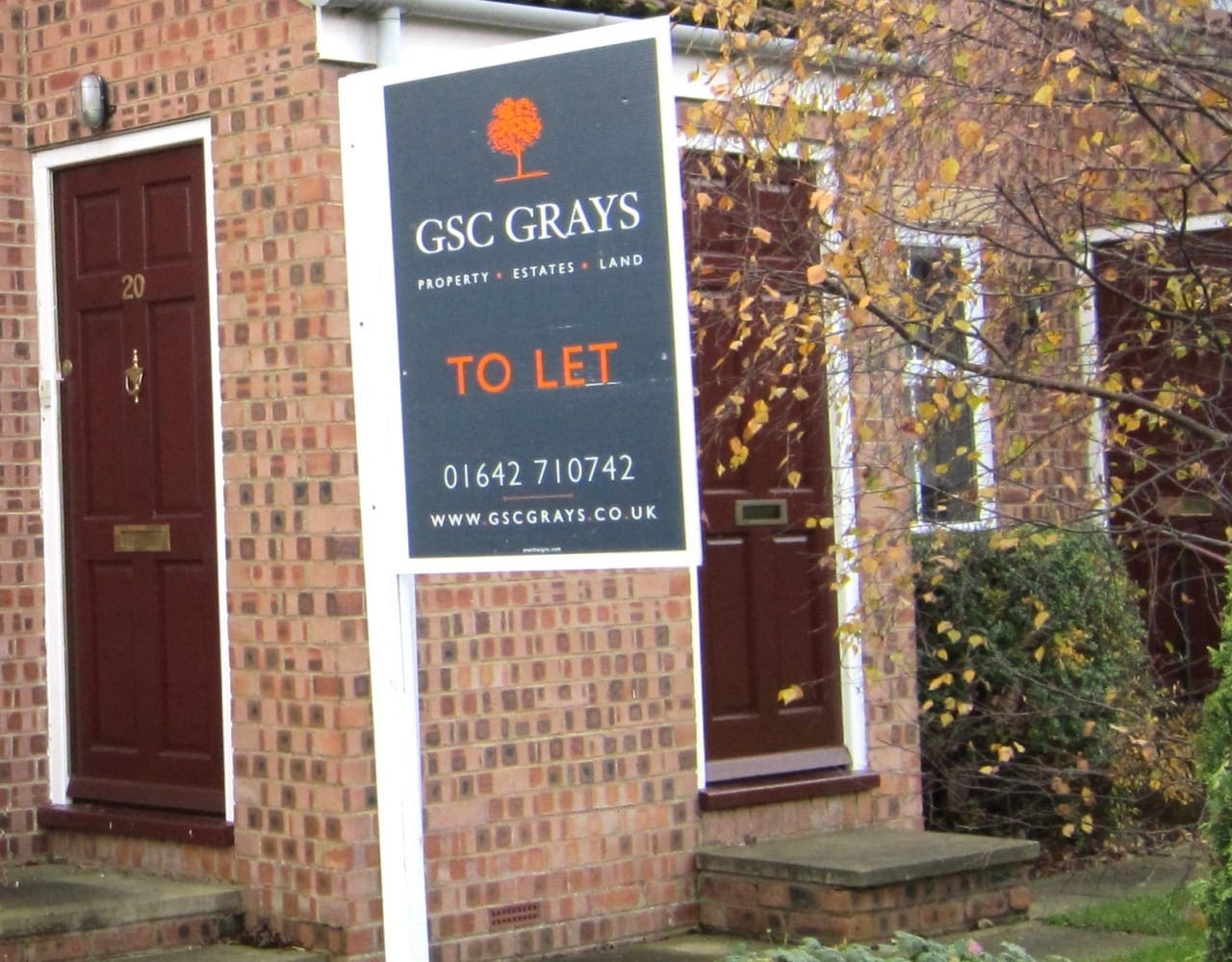Contact our offices
Main office
COLBURN
5 & 6 BAILEY COURT
COLBURN BUSINESS PARK
RICHMOND
NORTH YORKSHIRE
DL9 4QL
Estate Agency Offices are located in
BARNARD CASTLE, BOROUGHBRIDGE & RICHMOND
Residential Management Team
Our Offices
- Alnwick
01665 568310
Email Officealnwick@gscgrays.co.uk - Barnard Castle
01833 637000
Email Officebarnardcastle@gscgrays.co.uk - Boroughbridge
01423 590500
Email Officeboroughbridge@gscgrays.co.uk - Chester-Le-Street
0191 3039540
Email Officechester-le-street@gscgrays.co.uk - Colburn
01748 897630
Email Officecolburn@gscgrays.co.uk - Driffield
01377 337180
Email Officedriffield@gscgrays.co.uk - Hamsterley
01388 487000
Email Officehamsterley@gscgrays.co.uk - Hexham
01434 611565
Email Officehexham@gscgrays.co.uk - Kirkby Lonsdale
01524 880320
Email Officekirkbylonsdale@gscgrays.co.uk - Penrith
01768 597005
Email Officepenrith@gscgrays.co.uk

“Residential Property remains an enticing investment opportunity but be sure you understand all of the recent changes imposed on landlords”
The myriad of legislation for residential landlords is ever increasing and keeping up to date with the legal responsibilities can be difficult especially for self-managing landlords without the assistance of a Letting/Managing Agent.
Some of the fundamental legal responsibilities that landlords must adhere to include:-
Energy Performance Certificates (EPCs)
The Energy Act 2011 and the Energy Efficiency (Private Rented Property) (England & Wales) Regulations 2015 has a number of implications for owners and occupiers of property with the most significant being the minimum energy standards. It is important to ensure you check the date of any EPC’s you may have for your residential portfolios and ensure they are renewed appropriately. Generally EPCs last 10 years unless there are any significant alterations.
EPCs were introduced over 10 years ago in order to assess the energy efficiency of buildings with a grading system from A (most efficient) to G (least efficient).
| Energy Efficiency |
| Band A (92 plus) |
| Band B (81-91 |
| Band C (69-80) |
| Band D (55-68) |
| Band E (39-54) |
| Band F (21-38) |
| Band G (1-20) |
The Department for Business, Energy and Industrial Strategy has stipulated that with effect from the 1st April 2018 it will be law that every property set to be rented out (both residential and commercial) must have an Energy Performance Certificate (EPC) rating of at least E unless exemptions apply. In essence it will be unlawful to let residential or commercial properties with an EPC rating of F or G unless one of the grounds for dispensation can be claimed with a civil penalty of up to £4,000 being imposed for breaches.
The legislation will apply to all lettings, re-lettings, sub-lettings, assignments and transfers to SIPPS. Whilst residential properties let on a long term agreement or continuing on a periodic month to month basis do have longer timescales all residential/domestic tenancies must comply by April 2020 with non-domestic/commercial properties complying by 2023.
However, there are some exceptions to the rules including:-
- Where the works would fail the payback test. (namely the cost of undertaking the improvements exceeds the savings in energy over the next 7 years).
- The improvements will lead to the Market Value of the property decreasing by 5% or more.
- If the works are deemed to unacceptably alter the character or the appearance of a Listed building.
- Landlords are not obliged to make changes if the tenant does not want them to take place.
Many landlords particularly in the buy to let sector remain oblivious and unaware of the need to improve the energy efficiency rating of their properties and the need to bring them up to required standards and are potentially in for a costly shock in having to install cavity wall insulation, double glazing, loft insulation for example! Matters are more complicated for long leasehold properties where the freeholder’s consent may well be required for any energy efficiency improvements.
The minimum energy standards will have significant implications on the marketability and value of some properties from both a rental and capital value perspective.
Section 11
Other areas of legislation of relevance include Section 11 of the Landlord and Tenant Act 1985 which covers residential tenancies and the liabilities for both the landlord and tenant. Generally the landlord is responsible for the structure, roof, drains, gutters, provision of services and exterior decoration.
Gas Safety Regulations
Landlords are required to have gas appliances checked on an annual basis by Gas Safe registered engineers. A copy of the Gas Safety Record must be given to the incoming tenant before they move in and for any subsequent inspections within 28 days of certification.
Carbon Monoxide and Smoke Alarms
Under the Smoke and Carbon Monoxide Regulations which came into force on the 1st October 2015 landlords must ensure that at the tenancy commencement there is a working smoke detector on each floor level and a carbon monoxide alarm near to any solid fuel installations.
Right to Rent
With effect from the 1st February 2016 landlords have been required under the Immigration Act to undertake Right to Rent checks to verify tenants have a legal right to live in the UK with penalties of up to £3,000 per occupier for non-compliance.
Electrics
Whilst there is no specific requirements for electrics it is prudent for these to be checked by a NICEIC Registered contractor every 5 years or change of tenancy as electrics must be safe at the point of supply.
Houses in Multiple Occupation (HMOs)
HMOs are properties where non-related people share facilities such as a kitchen or bathroom. Properties over 3 floor levels and housing 5 or more people living as more than one household also need to be licensed by the Local Authority.
Deposits
Tenants deposits are required to be registered within an Approved Deposit Scheme with the tenant also provided with prescribed information explaining what happens to the deposit during the tenancy. If the deposit has not been property registered there are fines of up to three times the value of the deposit. It can also potentially jeopardise the validity of a notice to quit.
Assured Shorthold Tenancy Agreements (ASTs)
ASTs are the most common type of tenancy used in the UK.
- The property must be the tenant’s main residence.
- The agreements are only available to private tenants or groups of tenants.
- Tenants have a minimum right of occupation for at least 6 months.
- The annual rent must be at least £250 and no more than £100,000.
Tenancies are conventionally for a fixed term but can include a break clause allowing the landlord or the tenant to bring the agreement to an end before the actual contractual end date subject to the relevant notice being provided. In order to terminate an AST a Section 21 Notice needs to be served giving at least 2 months’ advance written notice to tenant although this can’t be served within the first 4 months of the tenancy. In the event a tenant fails to vacate legal proceedings will need to be initiated within 6 months of the date the notice was served to get a Court Order for possession.
In order to serve a valid Section 21 Notice the following are generally required.
- There is a properly registered deposit with an approved scheme and all the relevant information is provided to the tenant.
- The tenant is provided with a copy of the EPC, Gas Safety Certificate and How to Rent booklet.
- Compliance with the Smoke and Carbon Monoxide Regulations.
In those instances where a tenant has breached the terms of the tenancy agreement a Section 8 Notice is usually served.
Taxation
HMRC require all income and costs to be declared with records, invoices, receipts and statements kept for the Limitation Period of 6 years. For overseas landlords (non UK resident) using a letting agent an exemption can be obtained from HMRC so that the rent can be paid gross.
Stamp Duty
With effect from the 1st April 2016 anyone purchasing an additional property (not their only or main residence) for £40,000 or more must pay an extra 3% Stamp Duty above the current residential rates.
Up to £125,000 SDLT is zero
£125,001 to £250,000 SDLT is 2%.
£250,001 to £925,000 SDLT is 5%.
£925,001 to £1.5 million SDLT is 10%.
+ £1.5 million SDLT is 12%.
Landlords will generally have to pay an additional 3% on top of these rates for any additional properties. However purchasers have 36 months between selling a main residence and replacing it with another without paying the higher rates.
Tax Relief
Landlords will no longer be able to deduct all of their finance costs from their property income and will instead receive a basic rate reduction from their income tax liability for their finance costs. The relief is phased as follows:-
2017/18 the deduction from property income will be restricted to 75% of finance costs with the remaining 25% as a basic rate tax reduction.
2018/19 50% finance costs deduction and 50% given as a basic rate tax reduction.
2019/20 25% finance costs deduction and 75% given as a basic rate tax reduction.
2020/21 all financing costs incurred by a landlord will be given as a basic rate tax reduction.
Wear & Tear Allowance
The wear and tear allowance for fully furnished properties was replaced in April 2016 with a relief allowing landlords to deduct the costs they incur on replacing furnishings, appliances and kitchenware on a “like for like” basis or nearest modern equivalent.
Capital Gains Tax
Finally, CGT will be payable where a landlord sells a property which is not their main residence/home at a current rate of 28%.
It is not surprising that given the Stamp Duty changes implemented in April 2016 and the ever increasing burden of the above legislation that the “buy to let” sector has undergone some rationalisation and will continue to do so as a consequence of economic viability. If you have any questions regarding your responsibilities as a landlord don’t hesitate to contact our Residential Management Team, based in our Richmond office on tel: 01748 829210.
[team-member name=”Ashley Dodgson”]









